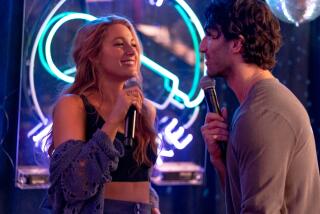Time and again
- Share via
READING a modest, casually elegant writer like Penelope Lively only spoils you for other novelists. There’s nothing self-promotional about her prose or her ideas: Her insights sneak up on you rather than arriving with bold Magic-Markered arrows that signal “I’m especially proud of this passage!” In “Consequences,” a multigenerational novel spanning 1935 to the present, a young mother named Ruth -- who loves her two children but who, like nearly all modern mothers, feels drained by them -- reflects offhandedly about the ways in which today’s children are different from those of yesteryear:
“It occurred to her that children had assumed power, over the century. Once, they were to some extent expendable: you had lots, in order to end up with a few. Today, they arrived to a safety net of state provision and a status of near sanctity.... Jess and Tom had appeared to be well-aware of their strength, and dictated from day one. Had the children of the past been less assertive, more propitiating, with survival itself in question? This seemed unlikely, given the nature of the beast; presumably their wails were merely background noise, casually ignored, instead of the deciding factor of daily life.”
That seemingly tangential reflection, acknowledging the historical fact of infant mortality even as it weighs the possibility that maybe, just maybe, there’s a difference between caring for our children and anointing them, is as good an example as any of how Lively’s observations run both wide and deep.
“Consequences,” Lively’s 14th novel, is a bold, lovely book, unsparing yet never gratuitously unkind. It’s at once epic and compact, a story of parents and children, of spouses and lovers, of the way disappointments can sometimes be cleared away, like brush, so that happiness -- even the imperfect kind, which is really the only kind -- can thrive.
“Consequences” opens in London in 1935: Lorna, a bright young woman frustrated by the expectations of her well-to-do parents, meets Matt, an engraver, on a park bench. Matt is sketching ducks for a commission he’s working on; Lorna, whose interest in art -- whose interest in anything -- has been discouraged by her parents, asks if she might take a look. Soon the two fall in love, and Lorna defies her parents to marry Matt. They rent a tiny Somerset cottage without indoor plumbing or electricity and begin building a life together.
Matt paints a frieze of ducks around the fireplace; upstairs, in the bedroom, he adorns the walls with a mural of joyous, dancing nudes. Lorna loves this marvelous expression of romantic, carnal love but worries that it might be improper, since she and Matt are renting this house from a nice older farm couple. Matt assures her that the painting can be covered with distemper when it’s time to move out, that it will always be their little secret.
Before long, Matt and Lorna have a daughter, Molly. And not long after that, Matt goes off to war. What follows is a story not just about families -- about Molly, who grows up and has a daughter, Ruth, both of them traditional and yet deeply unconventional -- but about England and the way the last century changed it. For Lively, the historical is personal: Our collective past is part of what makes us who we are. There’s a brief scene in “Consequences” recounting a conversation Lorna has with a village shopkeeper as the war is brewing. The woman remarks on the newspaper Lorna has chosen to buy: “Sure you want The Times, dear? I just stick to the Western Gazette these days. Local news is good enough for me. Sugar, flour, bread, marg., tea, a quarter pound of bacon -- is that all?” Understandably, this woman wants to keep dread from encroaching on her cozy life -- even as the shop items she rattles off, staples that ought to be readily available to anyone, are the very things that will soon come to be rationed. Her world is about to change, and she refuses to look at the signs.
“Consequences” isn’t a depressing book: If anything, Lively’s openness to the world (shown in the way her characters make wisecracks about, say, the blackouts of the 1970s or the way the spiraling gentrification of London could, in just a few years, double or triple the value of a house bought on the cheap) is an affirmation of the way even unwelcome changes can bring odd, unexpected joy into our lives.
There is one slight problem (which most multigenerational stories share): Just when you become hopelessly attached to the first generation, the next one comes along, with all its maddening modern ways. In “Consequences,” it’s so easy to fall in love with Lorna and Matt -- with the painted walls in their cottage, with the way Lorna packs Molly into the seat on the back of her bicycle and pedals down to the train station to meet Matt, who’s briefly on leave. But even though Lively nudges us away from Matt and Lorna, she never fully deprives us of them. Their presence, even after they’ve “gone,” is the lifeblood of the book. At one point Ruth reflects on how she can see her own face, her husband’s face, the faces of aunts and uncles, in those of her children. “The codes are eloquent, if you can read them,” she says. “Consequences” is Lively’s way of reading the code, of honoring the indelibility of those who came before us.
More to Read
Sign up for our Book Club newsletter
Get the latest news, events and more from the Los Angeles Times Book Club, and help us get L.A. reading and talking.
You may occasionally receive promotional content from the Los Angeles Times.










